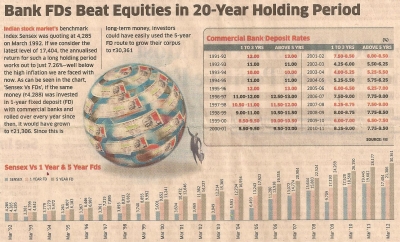According to common wisdom, equity outperforms fixed deposits, bonds and other fixed income instruments in the long term. Depending on who you talk to, ‘long term’ could mean anything from three years to a decade or even longer. Apart from vigorously spreading this message far and wide in the public, stock brokers, portfolio management services and fund managers never tire of telling the masses that they should not bother to cherry pick stocks or time the market. Instead, the investing public is advised to pay in a fixed sum of money into so-called Systematic Investment Plans every month and leave it to the professionals to do the investing on their behalf.
I turned a ‘closet skeptic’ of these notions when I found that several mutual funds in my personal portfolio had barely shown any appreciation even after I’d held them for 7-8 years. When I applied to redeem them, fund managers argued that my experience was one-off, the market appreciation was actually high but, net of entry load, exit load and other fees, I perceived it to be low, and blah blah blah. However, as a lay investor, I didn’t bother getting into these debates. After all, there was always the alternative instrument of bank fixed deposits. Whether high or low, they offered guaranteed returns. They didn’t erode capital via entry and exit loads. And, best of all, they were not accompanied by reams of fine print. For better or worse, I changed my personal investment strategy at that point although I kept my views to myself.
Not any longer. According to the following article in a recent edition of The Economic Times, fixed deposits overperformed stocks in the long term.

Although it doesn’t mention it explicitly, the table at the bottom of the article indicates that fixed deposits have beaten stocks from the very first year itself and not just after a 20 year holding period. Therefore, in actual practice, stocks haven’t outperformed fixed deposits even in the short or medium terms.
Having said that, this conclusion is true only for investments made in index stocks. It can’t be denied that certain scrips (e.g. Infosys) have delivered much greater returns than fixed deposits during this period. (On the other hand, as an ex-broker friend pointed out, a few other scrips have wiped out investor capital as well, but let me ignore that for a moment.) This is strike one against the common personal finance advice not to indulge in stock picking. Well, you know what, the only way you could’ve played the stock market and done better than fixed deposits was by picking the right stock – and not by passively settling for an index tracking fund.
It’s also interesting to note that, had this chart started just one year later (March 1993) when the Sensex was at 2281, the title of the ET article would’ve read the exact opposite of what it does now. In the very next year (March 1994), stocks would have shot up to 3779 whereas fixed deposits would have inched up to 2509, being 2281 + 10% (1-year interest in 1993-94). Having gained such a massive headstart so early, stocks would’ve stayed well ahead of FDs through this entire period despite the Sensex’s nosedive in 2009. This is strike two against conventional wisdom not to time the market. Quite clearly, a person who delayed his or her investment by one year would’ve made far greater returns from stocks compared to fixed deposits.
While none of this is a sign of a ‘rational market’ as economists would define the term, it’s the market we have. Fund managers and personal finance advisors will no doubt continue to urge people to invest in stocks by saying that most retail investors aren’t knowledgeable and lucky enough with picking the right stocks and timing the markets at the same time. To that, I’d say neither are the so-called investment professionals. On second thoughts, the question of luck doesn’t apply in their case – after all, they’re playing around with someone else’s money.
UPDATE: Looks like the situation is quite similar in the USA. In this FORTUNE interview, Scott Minerd of Guggenheim Partners says, “If you bought Treasuries and held them for the past 30 years, your returns have been quite attractive, probably in excess of the return you would have had if you’d invested in equities.”
UPDATE DATED 11 NOVEMBER 2016: Let alone index stocks, four years years after I wrote this post, it looks like even bluest of blue chips have underperformed bank FDs over the post 10 years (Source: Eight bluest of blue chips that couldn’t even match bank FD return over the past 10 years via Economic Times). I’m sure there are many more blue chips that failed to cross the FD hurdle rate than the eight stocks covered by ET.
UPDATE DATED 5 MARCH 2018: A dataset’s start date plays a very important role in determining returns from various investment products – and titles of blog posts like this one. Melvin Haskins provides a great example of this on Finextra. “This goes to show that you can prove anything with statistics, provided that you choose your start date. The UK equity market at the end of 1999 was at almost exactly the same level as it is today, yet house prices in the UK have doubled in the same period. Choosing 1900 as a start date is advantageous to prove your theory. Try picking 2000.”
UPDATE DATED 17 JUNE 2019: “It has taken the SENSEX more than 11 years to go from 20K to 40K” ~ @ET_Wealth . That’s a CAGR of 6.5%. Hmmm. Last 10 years is yet another long term in which Fixed Deposit has outperformed Equity.
UPDATE DATED 2 JANUARY 2023: SENSEX delivered 4.94% (or 2.8%) returns in CY 2022. Fixed Deposit delivered around 5.25% at the start of the year and 7% or more at the end of the year, both figures beating equity by a wide margin.
2022: Yet another year when Fixed Deposit beat Equity.#FD #Sensex #ETF #GoFigure pic.twitter.com/eeyHF4goLw
— Ketharaman Swaminathan (@s_ketharaman) January 3, 2023

https://twitter.com/PIAlmanack/status/1117380608190230529
Where @ET_Wealth reader Sarath Kumar uses Japan’s Nikkei Index – 40K in 1989 versus 21K in 2019 – to shatter the myth that staying invested in equity for the long term always yields better returns.
https://d2jhuj1whasmze.cloudfront.net/photos/normal/MwVFa.jpg
Seven years after I wrote this original post, people are still wondering why the index is up but their (stock) portfolio is down.
https://d2jhuj1whasmze.cloudfront.net/photos/normal/MBDX1.jpg
https://twitter.com/s_ketharaman/status/1485636081739608076